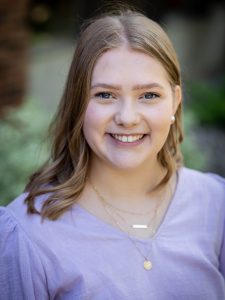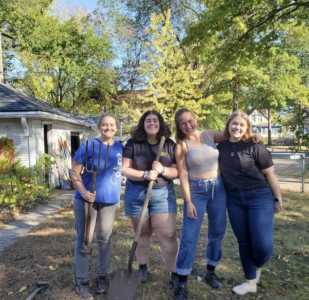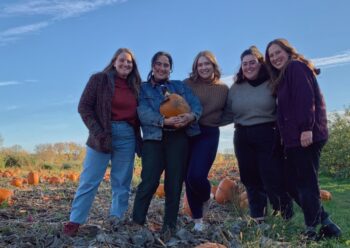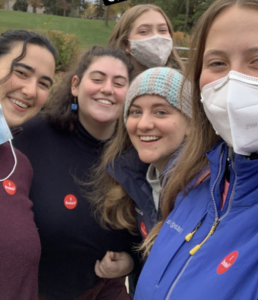 By Kayla Zopfi
By Kayla Zopfi
Year-of-service programs are ecosystems of mutual exchange, community engagement, and mentorship. Especially in the nonprofit sector, decades-long histories inform and affect programs that facilitate the connection between individuals who want to engage in their community (often recent college graduates) and organizations who are doing work that makes a difference (often those doing faith-based community service and/or organizing).

The volunteers living at Wellstone House in Powderhorn Park spend a Saturday preparing the yard for winter.
Being an undergrad student studying religion, political science, and interfaith studies meant that I spent four years deeply immersed in the metaphysical space that exists when you ask, “Why?” or, “What if?” As an almost-college-graduate with what felt like an endless list of possibilities for what I could do after graduating, I knew I wanted to put the theory I was learning into practice, but also cared about structural opportunities for mentorship and connection. A year of service seemed to provide exactly this.
“The intentional community aspect of a year of service is often what you make of it, and we have made it fit perfectly for our needs and personalities.”
This year, I get to live with four other volunteers in a beautiful, cozy house in the Powderhorn Park neighborhood in Minneapolis. Together we cook, clean, laugh, watch movies, vote, and solve all of the world’s problems. The intentional community aspect of a year of service is often what you make of it, and we have made it fit perfectly for our needs and personalities.
We also have two spiritual mentors, Andrew and Andrea, and two community mentors, Lydia and Leah. (If you were wondering – it isn’t a requirement to have coordinating names to be a spiritual or community mentor, but it sure is fun that it worked out that way this year!) We meet monthly with each pair of mentors to ensure we have the support we need, and to explore LVC’s core values: living simply and sustainably, intentional community, exploring spirituality, journey to inclusive community, and social justice.
WHILE THERE ARE so many aspects of this year of service that have been life-changing already, it’s the work that I get to do every day that is the best part. As the Administrative and Communications associate, I get to spend half of my time on the admin team, keeping up with office operations and assisting with parts of the synod’s equity work. The other half of my time, on the Communications team, is spent on our website and social media platforms and doing some writing.

This LVC community spends some time in a pumpkin patch this fall.
As with any synopsis, there are details left out of this description. What it doesn’t tell you is that I got to help transcribe interviews with leaders of our BIPOC and low-income congregations to be used for our ongoing equity lens study. It doesn’t tell you that I get to pitch and write stories that highlight some of the brilliant work happening every day in our congregations. It doesn’t tell you that I get to learn how to prepare people for press conferences, or present at city council meetings, or compile reports to make a master document for a gathering of the synod’s leaders on racial equity and justice.
“Generations of leaders have service programs footnoted in their pathways to peace-waging and change-making.”
Maybe these things seem simple or not very glamorous, but I’ve just spent four years learning that all of these things, and so much more, need to happen in order to create change. Through this program, I get to actually do them, not just read or hear about other people doing them, all while I have people around to specifically help me learn and explore and fail and try again – just as I hoped when I submitted my LVC application last February.

The volunteers are expressing their civic duty on November 2.
Participation is down for my, and almost every other, year-of-service program. Are there critiques to be made of the year-of-service model? Absolutely. Does that diminish the important opportunities these programs bring to all who invest into them? Certainly not. Generations of leaders have service programs footnoted in their pathways to peace-waging and change-making.
As a current volunteer, of course, I would be remiss if I didn’t end with a reminder that Lutheran Volunteer Corps 2022-23 applications are open for both placements and volunteers! For more information, head to lutheranvolunteercorps.org.

